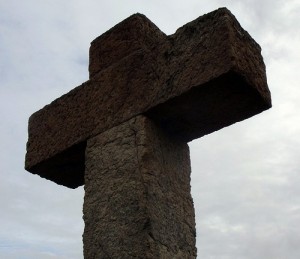This Sunday was the fifth day of Christmas, a season which lasts twelve days and extends all the way to Epiphany, the next holiday in the church calendar. On this day, Pastor David highlights “five golden rings” from Hebrews 2:10-18, a passage that explains the connection between Jesus’s birth and death. Listen in to this message, and allow the word of God to transform your life!
Sing Lullaby
But Mary treasured up all these things and pondered them in her heart. (Luke 2:19 NIV)
What if Mary, the mother of Jesus, had known the entire course of her son’s life at the moment of his birth? What if she knew that his life and ministry would spark a religious conflict in Jerusalem resulting in his execution? What if she could grasp the prophetess Anna’s words, “and a sword will pierce your own soul too” (Luke 2:35b NIV)? What if she could see the glory of Jesus’s resurrection, the promise of eternal life, even as he lay in her arms as a newborn?
Incarnation
One of the most profound truths of the Christian faith is easily overlooked at this time of year. We are in the season of Christmas, of course. (More technically, we are in the season of Advent; in the church year, the season of Christmas doesn’t begin until Christmas Day. But guess how long Christmas lasts? From December 25 until Epiphany, January 6, which is a total of – you guessed it – twelve days!) During this season, our thoughts turn toward the birth of a baby in Bethlehem, a small town outside Jerusalem, over two thousand years ago. We remember that birth because of what that child would do later in his life. He grew up to transform lives through his teachings, miracles, compassion, death, and resurrection. Jesus Christ changed the world as an adult, so we joyfully remember his birth. Otherwise, there would have been no reason for the gospel writers to make note of a child born to an unwed mother in a town far from her home. Right? Continue reading
Pursuing Peace
Jesus said some challenging words in the Sermon on the Mount, found in our New Testament in Matthew chapters 5, 6, and 7. Today I’d like you to take a few moments to find and read Matthew 5:38-48. Do that, if you would, before reading the rest of this article.
There is something counter-cultural about the way Jesus calls us to live. In the first-century world, the relatively young Roman Empire controlled Palestine, the area in which Jesus lived and ministered. Jews such as Jesus could have been forced to assist Roman soldiers in carrying supplies and materials for certain distances. Walking “the second mile” thus became something counter-cultural, almost revolutionary: it broke down the difference in power between a Jew and a Roman.
In the first-century world, if someone slapped you (with his right hand) on your right cheek, this was a power-building maneuver: the aggressor states his dominance over you with this action. Turning the other cheek (to receive another slap), as Jesus instructs, leaves the aggressor with an uncomfortable choice. Either he must use his left hand, which was considered unclean, or he must use his right hand again – but this time using the front of his hand, not the back of his hand, to strike your left cheek. Slapping with the front of the hand was understood as a challenge between equals; you might expect the aggressor to say “I challenge you to a duel!” at this point. Again, this is counter-cultural, almost revolutionary: Jesus tears down expectations of power-based relationships between people.
One year ago, a teenage girl stood up for the right of girls like her to receive an education. As a result, in October 2012 she was targeted by aggressors who wished to silence her message by eliminating the messenger. She and several others were shot, many of them killed, but she survived the gunshot wounds to her face. This girl spent the next year recovering and continuing to speak out against the injustices in her world. She became so well-known and beloved for her positions supporting justice and peace that she was nominated for the Nobel Peace Prize this year. Her name? Malala Yousafzai, a sixteen-year-old Pakistani girl.

In a recent television interview, Malala said something truly astounding. When asked what went through her mind when she realized the Taliban (her eventual attackers) wanted her dead, she said:
I started thinking about that, and I used to think that the Talib would come, and he would just kill me. But then I said, ‘If he comes, what would you do Malala?’ then I would reply to myself, ‘Malala, just take a shoe and hit him.’ But then I said, ‘If you hit a Talib with your shoe, then there would be no difference between you and the Talib. You must not treat others with cruelty and that much harshly, you must fight others but through peace and through dialogue and through education.’ Then I said I will tell him how important education is and that ‘I even want education for your children as well.’ And I will tell him, ‘That’s what I want to tell you, now do what you want.’
Malala Yousafzai is a practicing Muslim. Jesus is seen as a prophet within Islam, and in many ways I see Malala’s words above echoing Jesus’s thoughts from the Sermon on the Mount. What she said is counter-cultural, both in Pakistan and in the western world. Her stance toward her aggressors breaks down power dynamics and asserts the ultimate value that each person in the world has in God’s eyes.
What if we were to pursue peace as strongly in our own lives? What if we loved and prayed for our enemies? What if this is what it means to be “perfect” or “complete” or “mature,” as Jesus commanded us to be, in imitation of our heavenly Father?
Pastor David
Changing Colors
It’s that time of year again – those few weeks, here in central Michigan, during which millions of leaves change color and fall to the ground. This could cause a number of reactions within you: anticipation of the winter months that lie ahead; excitement for the prospect of earning money by raking leaves; or simply amazement at the colorful beauty of the earth.

I have been struck by this beauty in the past week or two. Even on my short walk from home to the church, I can see many shades of red, yellow, orange, and purple – all signs of the changing seasons. Have you ever wondered about why leaves change color in the fall? It has been a while since I studied trees in elementary school, so I Googled the subject and found 38.7 million results. It’s a popular subject!
As you may remember, leaves are green because they contain chlorophyll, a pigment crucial to the process of photosynthesis. Chlorophyll helps plants create energy from sunlight; it absorbs light with wavelengths in the red and blue areas of the spectrum. But chlorophyll reflects green light, which is why living leaves look green.
The trouble is that chlorophyll constantly decays, so it must be constantly replaced by plants. All spring and summer long, chlorophyll helps plants store up energy so that they can survive the winter. But when the days grow shorter in the fall and sunlight becomes less readily available, plants stop producing chlorophyll. At that point, leaves begin to die, slowly lose their greenness, and change into colors that really have been there all along but were covered up by the green pigment.
If you are sensing that I might turn this into an analogy about our spiritual lives, you are figuring me out: there’s a sermon in everything! However, I don’t want to compare our lives as believers to the changing colors of leaves for two reasons:
- Spiritual life is not cyclical. While trees go through this process year in and year out, we are not guaranteed regular, recurring periods of “spiritual dryness.” There may be seasons in which we wander in the wilderness, but the light of God does not take a winter-long vacation from us.
- The sin nature is not always lurking, buried deep within us. If we think of “green” as “life in Christ” and “red/yellow/etc.” as “sinful living,” then we might reason that our sinfulness is always buried just beneath the surface; if the greenness ever fades away, our “true colors” will show. But this is not the case. Salvation is about the gift of a new identity; our sins, red as scarlet, have been washed away by the blood of the Lamb, making us white as snow (Isaiah 1:18). We may turn from Christ and return to sin, but it is not as if sin were lurking inside us, waiting for the right opportunity to take over.
Take a minute to read John 15:1-17, in which Jesus says he is the vine and we are the branches. One thing is for sure: leaves (branches) do not stand a chance of surviving if they are disconnected from the tree (vine). Let’s stay green (bear fruit); let’s remain connected to Christ and to each other. Let’s continue to find new ways to love each other during the changing seasons of our lives!
–Pastor David
Universal Redemption
This week, the Catholic Church’s Pope Francis gave a brief message in which he made some remarks that have prompted worldwide attention. In these remarks, he spoke about the common human desire to “do good” – something that unites people of all cultures and faith traditions.

Pope Francis’s comments were based on the gospel reading for the day, Mark 9:38-40, in which Jesus says that someone doing miracles in his name should be allowed to continue even though he is not part of the “core group” of disciples. The rationale? “Whoever is not against us is for us,” said Jesus. This led the pope to state that all people, even atheists, are redeemed by the blood of Jesus, because all people are created in the image of God and all people have the God-given command (and desire) to “do good.”
Before we jump to conclusions and responses, let’s remember a few things: the world is a complicated place, sound bytes often reduce conversations unfairly, and Pope Francis raises a few worthwhile points here:
- If we consistently “do good,” then we will avoid war, murder, and killing in God’s name – which is against God’s character.
- God has indeed created all people in his own image. This means every single person is loved by God and deserves our respect, compassion, and love.
- “Doing good” in community leads to a “culture of encounter” which breeds peace, not conflict. Said differently, we are to live in community with each other, not in isolation.
I have been very interested in Pope Francis, his beliefs, and his practices since he was inaugurated earlier this year. I appreciate a great deal about him: his call to poverty, his emphasis on service, his humility (even in such a high position), his simplicity. These are exciting days to have such a pope in the world.
Yet we need to be careful when we talk about how the blood of Christ redeems all people. It is true that God desires all people to be saved; he does not want anyone to perish (2 Peter 3:9). God did create us in his image exactly so we might enjoy right relationship with him forever. But even in Old Testament days, forgiveness for sins had to be obtained through animal sacrifices, which individual believers would bring to the tabernacle or temple. Redemption was not automatic then, and it is not now.
…because Jesus lives forever, he has a permanent priesthood. Therefore he is able to save completely those who come to God through him, because he always lives to intercede for them. Such a high priest meets our need—one who is holy, blameless, pure, set apart from sinners, exalted above the heavens. Unlike the other high priests, he does not need to offer sacrifices day after day, first for his own sins, and then for the sins of the people. He sacrificed for their sins once for all when he offered himself. (Hebrews 7:24-27 NIV)
The most important faith-related question for any person is this: What will you do with Jesus? The answer to that question – for better or worse – transforms life, community, and why we “do good.” Let us faithfully proclaim Jesus as the Savior of the world and encourage those around us to enter into relationship with him.
–Pastor David
Beneath a Veil
On this Good Friday, I’d like to share a hymn with you that has helped me center myself on the spiritual meaning and depth of Jesus’s sacrifice. The hymn is entitled “Thee We Adore,” and the English text below is translated from Thomas Aquinas, an important 13th century priest. Tara and I found this hymn through one of the area choirs in which we sing; the tune we sang (by a composer named Candlyn) is hauntingly beautiful.
Thee we adore, O hidden Savior, thee,
Who in thy sacrament art pleased to be;
Both flesh and spirit in thy presence fail.
Yet here thy presence we devoutly hail.

Thomas Aquinas was instrumental in the philosophical arguments behind the Catholic doctrine called “transsubstantiation” – that is, that the bread and wine of the Lord’s Supper literally become the body and blood of Jesus when we share at his table. We in the Church of God do not believe this happens, but we can certainly agree that “both flesh and spirit in thy presence fail.” Being in the Lord’s presence is truly awesome.
O blest memorial of our dying Lord,
Who living bread to men doth here afford!
O may our souls forever feed on thee,
And thou, O Christ, forever precious be.
Jesus taught us that he is the Bread of Life (John 6:22-59). When we share at the Lord’s table, we are reminded that he is true food and true drink. And when we gather at the foot of the cross, we are reminded of the truth behind the meal that we share: the bread and wine remind us of the great price Jesus paid so that we might have forgiveness and relationship with him.
Fountain of goodness, Jesu, Lord and God,
Cleanse us, unclean, in thy most cleansing flood.
Increase our faith and love, that we may know
The hope and peace which from thy presence flow.
Jesu, short for Jesus, is the source of all hope and peace. His blood is a “most cleansing flood” that can wash us clean from sin through faith and love. This season is a powerful time to remember, to wash, and to remain quietly in his presence.
O Christ, whom now beneath a veil we see,
May what we thirst for soon our portion be,
To gaze on thee unveiled, and see thy face,
The vision of thy glory and thy grace.
Our hope is always for a future with Jesus Christ. When we stand at the foot of the cross, at the tomb containing Jesus’s body, we wait for a yet-to-be-revealed future. When we see the bread of the Lord’s Supper hidden beneath a cloth, we yearn for the time when we can see Christ face to face. Until then, we thirst, we hunger, we meditate, we draw close to Christ, we hold vigil at the tomb.
I’ll see you on the other side.
–Pastor David
At the Name of Jesus
The italicized hymn lyrics found below were written by Caroline M. Noel (1817-1877). I invite you to meditate on them with me.
At the name of Jesus every knee shall bow,
Every tongue confess him King of glory now;
‘Tis the Father’s pleasure we should call him Lord,
Who from the beginning was the mighty Word.
Philippians 2:1-11 teaches us that one day every knee will indeed bow at the name of Jesus. The one whom we remember in the current seasons of Lent and Resurrection is the very Word of God (John 1:1), who has existed with the Father and the Spirit from the beginning.
At his voice creation sprang at once to sight,
All the angel faces, all the hosts of light,
Thrones and dominations, stars upon their way,
All the heavenly orders in their great array.
We frequently remember Jesus as the creator of all things that we can see: the sun, moon, and stars; the trees, flowers, and oceans; the horses, dogs, and cats. Yet scripture teaches (Colossians 1:15-16) that Jesus is the creator of all things, both visible and invisible. This Jesus is the one who holds all power and authority in his hand. Nothing in this universe has power to do anything outside the scope and wisdom of the authority of Christ.
Humbled for a season, to receive a name
From the lips of sinners unto whom he came,
Faithfully he bore it spotless to the last,
Brought it back victorious when from death he passed.
This season is crucial for us as believers. We take special care to tell the story of Jesus: from Palm Sunday, through Maundy Thursday, to Good Friday, to Resurrection Sunday and beyond. Yet what a mystery it is that this is the same Jesus who created the universe! “Humbled for a season,” he took a human name through his life, death, and resurrection.
Bore it up triumphant with its human light,
Through all ranks of creatures, to the central height,
To the throne of Godhead, to the Father’s breast;
Filled it with the glory of that perfect rest.
Soon after his resurrection, Jesus ascended into heaven, where he now sits at the right hand of God the Father. Can you imagine what that ascension might have looked like? We often think of heaven as a “perfect rest”; read Hebrews 4 for a beautiful passage on that topic.
Name him, brothers, name him, with love as strong as death,
But with awe and wonder, and with bated breath;
He is God the Savior, he is Christ the Lord,
Ever to be worshipped, trusted, and adored.
“Love as strong as death” (Song of Solomon 8:6) is exactly the type of love that Jesus showed for us (John 15:12-13). Let us always remember to approach our Lord with humility, respect, and sacrificial love. The above verse is, I believe, my favorite of this hymn’s seven verses!
In your hearts enthrone him; there let him subdue
All that is not holy, all that is not true.
Crown him as your captain in temptation’s hour;
Let his will enfold you in its light and power.
In the Church of God, we call this “holiness” or “sanctification.” Those who come to believe in Jesus as Savior still have something left to experience: the complete removal of “all that is not holy/true” by the power of Christ. Our complete hearts and minds are to be turned over to the Lord, so that his will becomes the course of our lives.
Brothers, this Lord Jesus shall return again,
With his Father’s glory, with his angel train;
For all wreaths of empire meet upon his brow,
And our hearts confess him King of glory now.
Until that day, when Jesus will return in his glory, we remain faithful. Be encouraged, brothers and sisters: the story of Jesus is true, and it is Truth. Confess Christ as “King of glory” (Psalm 24) every day, and allow him to continue to transform your lives!
(Here’s a video of a choral arrangement of this hymn.)
–Pastor David
Go to Where the Water Is
Today, I took the afternoon (as I often do on Thursdays) to finish up the sermon for Sunday morning. A good bit of my time in sermon writing is spent in thought, prayer, and meditation, and so I often find myself looking out the windows of my church office while I organize my thoughts. Today, I saw something I haven’t noticed before, something that interrupted my train of thought, something I’d like to share with you:
The snow on the roof is melting in the sunlight, and water drops are falling off the edge of the roof onto the ground below. Suddenly, a few birds – cardinals, from the looks of one of them – land on the edge of the roof, bend over, and drink from the water droplets as they trickle off the edge of the building.

I think what struck me about this scene is just how odd of a drinking position that must be for the birds. Can you imagine jumping into a stream of running water, facing downstream, bending over, and drinking until your thirst is quenched? I suppose the birds found this water much more palatable than the running water in nearby Bullock Creek – a stream from which neither birds nor humans would drink willingly!
These birds went to where the water is, and they found satisfaction for their thirst. Water is fuel for life: nearly all species of plants and animals depend on water for survival. So we too, in our daily lives, need spiritual refreshment and nourishment. Where do we find water for the soul?
“On the last and greatest day of the Feast, Jesus stood and said in a loud voice, ‘If anyone is thirsty, let him come to me and drink. Whoever believes in me, as the Scripture has said, streams of living water will flow from within him.’ By this he meant the Spirit, whom those who believed in him were later to receive. Up to that time the Spirit had not been given, since Jesus had not yet been glorified.” (John 7:37-39 NIV)
Friends, in your everyday walk of faith, go to where the water is: even Jesus Christ, the one whose birth we celebrate this season, whose glory was revealed on the cross and in the empty tomb, whose Spirit dwells in those who believe, whose return we await with great hope and anticipation. Drink deeply from this source of life, no matter if it seems like a strange thing to do from the world’s perspective. There is no better way to live!
–Pastor David
Was Jesus Ever Bullied?
This fall, I have the pleasure of working with a handful of fifth- and sixth-grade boys on a Boy Scout course entitled “God and Church.” The course focuses on who Jesus is, what the church is about, and how we can plug in to the life and ministry of the church through worship and service. So far, I have really enjoyed the time I’ve been able to spend with these boys and their parents on a weekly basis!
At our last meeting, we were talking about how much like us Jesus is – that is, how he is fully human and experienced things just like we do. (The next session is about how Jesus is fully divine: we believe both!) During the course of our conversation, one of the boys asked me a very insightful question:
“Was Jesus ever bullied?”

That question made me stop and think for a while. We often talk about how Jesus was tempted in every way, like we are, but never sinned (Hebrews 4:15). We remember how Jesus was tempted by Satan in the wilderness (Matthew 4:1-11). We remember how Jesus had real human emotions like anger (John 2:12-22), sorrow (John 11:32-37), love (Mark 10:17-21), and many others. But was Jesus ever bullied?
We don’t know much about his childhood; just a couple of stories survive about those years, and none of them apply to this particular issue. So we can’t say for sure that Jesus was bullied as a child. But certainly there were occasions when Jesus as an adult was ignored, made fun of, or treated unfairly by other people:
- During his ministry, Jesus’s own family – his very own mother and brothers – thought he was crazy and out of his mind. (Can you imagine? At least his mother Mary should have known better!) They tried to make him keep quiet, stop teaching, and stop performing miracles. He responded by reminding everyone that obeying God’s will is his highest priority. (See Mark 3:20-35.)
- Jesus instructed his followers to expect to be hated by others because of their belief in him. Being a Christ-follower makes a person subject to the ridicule of other people, just as it did for Jesus himself and all the prophets of God before him. Jesus responded to the world’s hatred of him by speaking the truth, trusting in God, and remaining faithful to his calling. (See Luke 6:22-23, Matthew 24:9-10, and John 15:18-27.)
- When Jesus had been sentenced to die by crucifixion, he was flogged mercilessly and was handed over to the Roman guards. They stripped his clothes away and began to mock him: they put a royal robe over his bleeding shoulders, and they made a royal crown – made of thorns, not gold – and forced it on his head. They made fun of him, spat on him, and hit him on the head over and over again. He responded by not saying a word through the whole affair. (See Matthew 27:24-31.)
- Even while he was hanging on the cross, in his final moments, Jesus was mocked by the soldiers, bystanders, and other criminals. All were saying that if he really was the King of the Jews, why didn’t he save himself? Jesus responded by asking God to forgive those who were hurting him and by speaking kindly to a dying man who asked Jesus to remember him. (See Luke 23:33-43.)
“Was Jesus ever bullied?” I think the answer is “absolutely, yes” – even if bullying looks slightly different today. Many young people today are bullied in school and in other places, for many kinds of reasons. This is an awful truth, and we as people of faith must stand up against bullies on behalf of the children in our community.
Jesus understands that terrible experience, too, on a personal level. What’s more, he shows us all how we should respond: by trusting in God, by remembering the truth about who we are as God’s children, and by relying on his strength for every day’s challenges.
–Pastor David